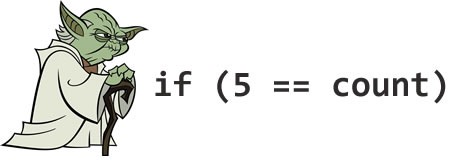Every field comes up with its own jargon, and oftentimes subgroups within a field come up with their own specific words or phrases (those of you familiar with Microsoft Canada’s Developer and Platform Evangelism Team know that we have our own term for “broken”, named after one of our teammates who is notorious for killing all sorts of tech gear).
A question recently posted on Stack Overflow asked for people to submit programming terms that they or their team have coined and have come into regular use in their own circles. I took a number of the submissions and compiled them into the alphabetically ordered list below for your education and entertainment.
Have you come up with your own jargon? Tell us in the comments!
Banana Banana Banana

Placeholder text indicating that documentation is in progress or yet to be completed. Mostly used because FxCop complains when a public function lacks documentation.
Example:
/// <summary> /// banana banana banana /// </summary> public CustomerValidationResponse Validate(CustomerValidationRequest request, bool ...
Barack Obama
A project management account to which the most aspirational tickets – stuff you’d really like to do but will pobably never get approval for – gets assigned.
Bicrement
Adding 2 to a variable.
Bloombug
A bug that accidentally generates money. [Joey’s note: I have never written one of these.]
Bugfoot

A bug that isn’t reproducible and has been sighted by only one person. See Loch Ness Monster Bug.
Chunky Salsa
A single critical error or bug that renders an entire system unusable, especially in a production environment.
Based on the chunky salsa rule from TVTropes: Any situation that would reduce a character’s head to the consistency of chunky salsa dip is fatal, regardless of other rules.
Configuration Programming / Programmer
Someone that says they are a programmer but only knows how to hack at configuration files of some other pieces of software configuration to make them do what they want.
Counterbug
A defensive move useful for code reviews. If someone reviewing your code presents you with a bug that’s your fault, you counter with a counterbug: a bug caused by the reviewer.
DOCTYPE Decoration
When web designers add a proper DOCTYPE declaration at the beginning of an HTML document, but then don’t bother to write valid markup for the rest of it.
Drug Report
A bug report so utterly incomprehensible that whoever submitted it must have been smoking crack. The lesser version is a chug report, where the submitter is thought have had one too many.
Duck

A feature added for no other reason than to draw management attention and be removed, thus avoiding unnecessary changes in other aspects of the product.
This started as a piece of Interplay corporate lore. It was well known that producers (a game industry position, roughly equivalent to PMs) had to make a change to everything that was done. The assumption was that subconsciously they felt that if they didn’t, they weren’t adding value.
The artist working on the queen animations for Battle Chess was aware of this tendency, and came up with an innovative solution. He did the animations for the queen the way that he felt would be best, with one addition: he gave the queen a pet duck. He animated this duck through all of the queen’s animations, had it flapping around the corners. He also took great care to make sure that it never overlapped the “actual” animation.
Eventually, it came time for the producer to review the animation set for the queen. The producer sat down and watched all of the animations. When they were done, he turned to the artist and said, “That looks great. Just one thing – get rid of the duck.”
Fear-Driven Development
When project management adds more pressure, such as by firing a member of the team.
Ghetto Code

A particularly inelegant and obviously suboptimal section of code that still meets the requirements. [Joey’s note: I’ve written ghetto code before, but that’s because I’m street, yo!]
Hindenbug
A catastrophic data-destroying bug. Oh, the humanity!
Hocus Focus Problem
Unexpected behavior caused by changes in focus, or incorrect setting of focus. Could also be used to describe an app stealing your focus.
Hot Potato / Hot Potatoes
A fun way to pronounce http:// and https://.
IRQed
Annoyed by interruptions. Pronounced like and has a similar meaning to “irked”.
Jimmy

A generalized name for the clueless/new developer. The submitter at Stack Overflow writes:
We found as we were developing a framework component that required minimal knowledge of how it worked for the other developers. We would always phrase our questions as: “What if Jimmy forgets to update the attribute?”
This led to the term “Jimmy-proof” when referring to well designed framework code.
It’s probably best not to use this term around IronRuby developer Jimmy Schementi.
Loch Ness Monster Bug
A bug that isn’t reproducible and has been sighted by only one person. See Bugfoot.
Megamoth
MEGA MOnolithic meTHod. Usually stretches over two screens in height and often contained inside a God Object (an object that knows or does too much).
.NET Sandwich
When .NET code called native code which calls other .NET code and makes the poorly designed application crash.
n-gleton
A class that only allows a fixed number of instances of itself.
NOPping
Not napping, but simply zoning out. Comes from the assembly language instruction NOP, for No OPeration, which does nothing.
Pokemon Exception Handling
For when you just gotta catch ’em all!
Reality 101 Failure

The program (or more likely feature of a program) does exactly what was asked for, but when it’s deployed it turns out that the problem was misunderstood and the program is basically useless.
Refuctoring
The process of taking a well-designed piece of code and, through a series of small, reversible changes, making it completely unmaintainable by anyone except yourself. It’s job security!
The Sheath
The isolating interface between your team’s (good) code, and the brain-dead code contributed by some other group. The sheath prevents horrible things (badly named constants, incorrect types, etc.) in their code from infecting your code.
[Joey’s note: I’ve heard the term “shim” used for this sort of construct. I’ve used the term “transmogrifier” for this sort of thing.]
Shrug Report
A bug report with no error message or “how to reproduce” steps and only a vague description of the problem. Usually contains the phrase “doesn’t work.”
Smug Report
A bug report submitted by a user who thinks he knows a lot more about the system’s design than he really does. Filled with irrelevant technical details and one or more suggestions (always wrong) about what he thinks is causing the problem and how we should fix it.
Stringly-Typed

A riff on strongly-typed. Used to describe an implementation that needlessly relies on strings when programmer- and refactor-friendly options are available.
Examples:
- Method parameters that take strings when other more appropriate types should be used
- On the occasion that a string is required in a method call (e.g. network service), the string is then passed and used throughout the rest of the call graph without first converting it to a more suitable internal representation (e.g. parse it and create an enum, then you have strong typing throughout the rest of your codebase)
- Message passing without using typed messages etc.
Excessively stringly typed code is usually a pain to understand and detonates at runtime with errors that the compiler would normally find.
Unicorny
An adjective to describe a feature that’s so early in the planning stages that it might as well be imaginary. This one comes from Rails Core Team member Yehuda Katz, who used it in his closing keynote at last year’s Windy City Rails to describe some of Rails’ upcoming features.
Yoda Conditions

The act of using
if (constant == variable)
instead of
if (variable == constant)
It’s like saying “If blue is the sky”.
367 replies on “New Programming Jargon”
Yoda coditions are actually very useful:
if (null = a) //will throw a compiler error
if (a = null) // will not in some languages (just be always false)
this one is sometimes a bitch to track down.
Lol refuctoring is my favorite! I should do a lot of that stuff in the future. Having a nice commithistory, with the last commit just effin everything up :D
Great summary :-).
That would be great that you add ids to your HTML, so that the terms can be linked directly from outside using #anchors.
Thanks & cheers.
[…] you seen code fragment like this? I mean there are lot of interfaces that provide stringly-typed access to some of the internals of the entity. This particular code fragment could be seen a lot in […]
Yoda Conditioning actually makes sense in PHP when you want to find the first of a list of variables that matches a value – as in
switch(true){
case $v1:
…
case $v2:
…
}
etc.
I often refer to “Sheath” code as “The Condom”, because it keeps your app from getting code herpes.
[…] > I find screencasts are the most efficient way of bug reporting, because not only does the bug need to be found, but now it also has to be replicated in order to catch it on recording. If the error can’t be replicated, it was another Bugfoot. […]
Weeping Angel or Quantum Bug – In reference to a bug that reportedly appears at random and can not be reliably reproduced. This can also be a bug that can be reproduced in release code but magically disappears when debug code is added to detect it.
Weeping Angels are from the Doctor Who series, they are a species of Quantum Locked beings that turn to stone when observed. If they catch you they steal your time from you, sending you back in time to some other era. http://en.wikipedia.org/wiki/Weeping_Angel
[…] developers are known to come up with jargon to describe different software programming situations. One of our favorites is the term Bugfoot, […]
[…] wanted to check for another way of saying “code refactoring” in nerd jargon and I found this fabulous blog entry that is already two years old but relevant enough in both the programming field as well as […]
Believe it or not Yoda conditions are fine some times. Once I had to do something like:
if(“someVal”.equals(someVar)) {
…
}
because someVar could be null and so someVar.equals(“someVal”) could throw a null pointer
Joe Code. Named after a former programmer named Joe. He would use variables such as:
joe1 = prodcode
joe2 = serlot
If (joe1 = joe2)
joe 3 = joe 1
else {
joe3 = joe 2
endif
In a program with thousands of lines of code, it was very difficult to find out what value was in any of the Joe code variables at any time…
[…] developers are known to come up with jargon to describe different software programming situations. One of our favorites is the term Bugfoot, […]
The Jesus Bug – the bug you thought you killed but comes back several days later.
[…] http://habrahabr.ru/qa/13792/ http://cyrille.martraire.com/2010/01/the-string-obsession-anti-pattern/ http://monospacedmonologues.com/post/11534596516/stringly-typed http://world.episerver.com/Blogs/Valdis-Iljuconoks/Dates/2012/1/Stringly-typed-Composer-functions/ http://blog.rough-sea.com/2010/10/from-a-stringly-typed-to-a-strongly-typed-messaging-system-part-i/ http://habrahabr.ru/blogs/programming/111432/ http://habrahabr.ru/blogs/development/96978/ http://blog.lexspoon.org/2010/05/stringly-typed-code.html http://www.globalnerdy.com/2010/05/09/new-programming-jargon/ […]
[…] Novi programerski žargon […]
[…] Jargon […]